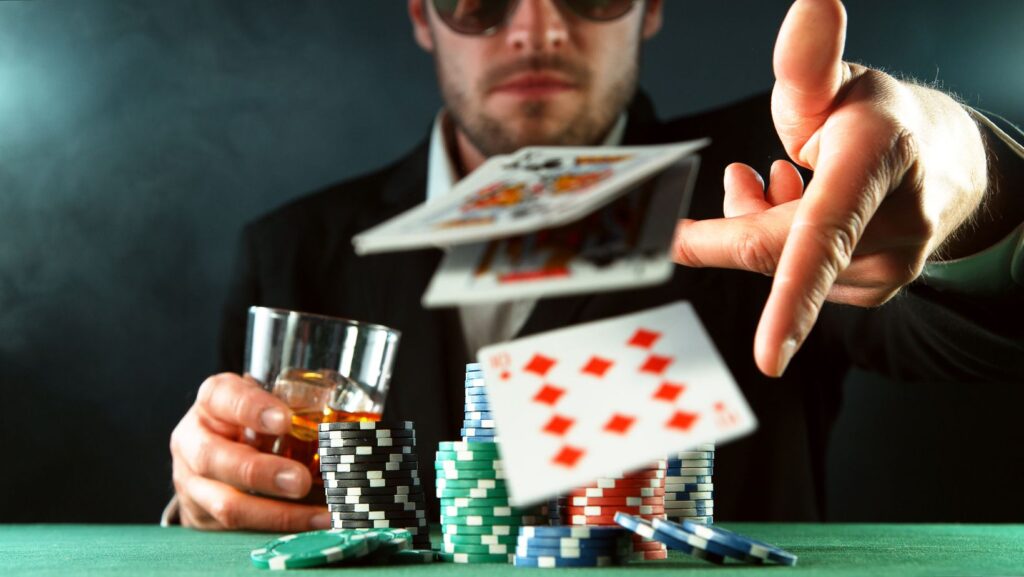We’re going to unravel the intriguing realm of poker in this article, making it a fun and easy-to-understand journey for all. By the end, you’ll have a good handle on poker hands, master essential strategies, and grasp the psychological nuances that separate amateur players from the pros. So, let’s dive into the captivating world of online poker, shall we?
Getting a Grip on Poker Hands
If you want to get really good at Texas Holdem or any other poker game, it’s crucial to have a solid understanding of poker hand rankings. Let’s break them down in simple terms:
- High Card: When none of your cards match, your highest card plays.
- One Pair: Two cards of the same rank, like two Kings.
- Two Pair: Two different pairs, such as two Queens and two Fives.
- Three of a Kind: Three matching cards, for example, three Jacks.
- Straight: Five consecutive cards of different suits, like 5-6-7-8-9.
- Flush: Any five cards of the same suit, regardless of their sequence.
- Full House: The powerful combo of Three of a Kind plus a Pair.
- Four of a Kind: Exactly what it sounds like – four cards of the same rank, let’s say four Queens.
- Straight Flush: Five consecutive cards of the same suit – a pretty hand indeed!
- Royal Flush: The creme de la creme – the Ace, King, Queen, Jack, and Ten of a single suit.
It’s like ranking your favorite TV shows or meals – once you get the hang of it, recognizing the stronger hands becomes second nature.
Bluffing – It’s Not Just for Poker Faces

At its core, bluffing is really a mind game. In a recent update, BetRivers Poker added hand history downloads and a HUD toggle, which can greatly enhance your bluffing strategy. Have you ever successfully bluffed in a poker game? I remember this one time…(*share personal bluffing story*). So what are your go-to bluffing tactics? I’d love to hear them!
Why Poker is More Than Just Luck
John Dollinger, the 2025 World Series of Poker Circuit Tulsa Main Event Champion, is a prime example of how strategy, not just luck, plays a crucial role in poker. There are a few important things to keep in mind when it comes to poker strategy:
- Position Play: Being one of the last to act gives you a strategic advantage.
- Hand Selection: Be picky about which starting hands you play, especially early on.
- Bluffing: Use it sparingly and only when your bluff is likely to succeed.
- Pot Odds and Implied Odds: Understanding these will help you make smarter bets.
- Bankroll Management: Know your limits, and stick to them.
- Table Selection: Pick games where you have the skill edge.
- Continuous Learning: The game is always evolving, so keep updating your strategies.
Mastering these strategies takes practice, but consistently applying them can significantly boost your chances of success – even at prestigious events like the World Series of Poker.
The Psychology of Poker
As we’ve seen, poker isn’t just about luck – it’s a deep and layered game. The psychology behind it often separates the good players from the great ones. Learn to control your emotions, read your opponents’ tells, cultivate a deceptive table image, stay adaptable, maintain confidence, and above all else, be patient.

For example, I once played against someone who consistently overbet when bluffing. By staying disciplined and calling their bluffs at the right moments, I accumulated chips without needing premium hands. Understanding these psychological patterns allowed me to adjust my strategy accordingly.
If you’re looking to dive deeper into the mindset side of poker and other casino games, check out casinojesus.com. They offer great resources on mental game improvement.
Wrapping Up Our Poker Journey
Congrats, you’re now equipped to take on the virtual felt like a seasoned pro! We’ve covered the fundamentals of poker hands, strategy essentials, and those all-important psychological factors that level up your game.
Remember, mastering poker is an ongoing process – apply these concepts, keep studying, and don’t be discouraged by setbacks. Every hand offers a chance to grow and refine your skills.
We’d love to hear your experiences putting these ideas into practice. What strategies worked greatly for you? How has understanding poker psychology impacted your play? Share your thoughts and tips in the comments!

